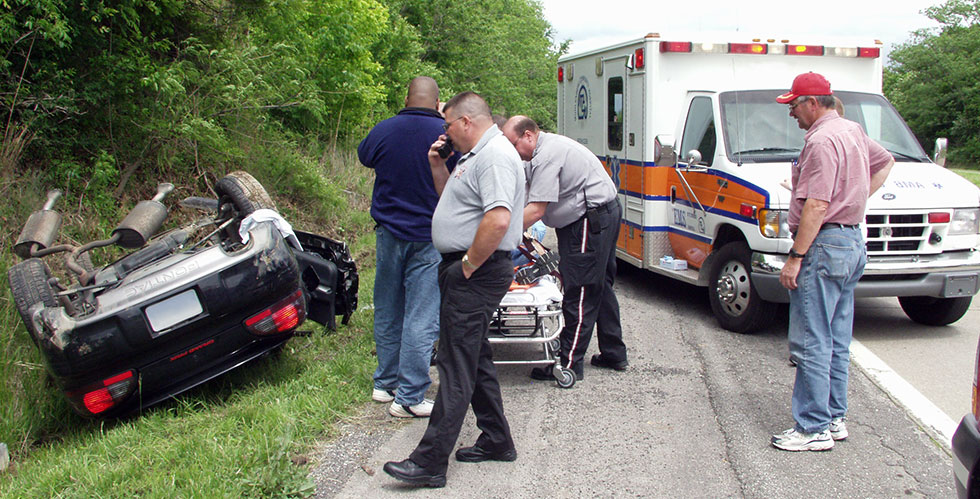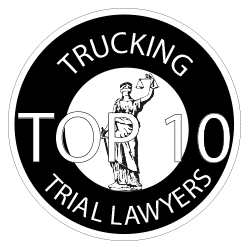REAR-END TRUCKING CRASHES
This photo is of an actual case handled by Kentucky Personal Injury Lawyer Flora Templeton Stuart who traveled to the scene with a team of experts. Our client who sustained serious injuries was traveling on the highway when his vehicle was pushed under a semi-truck traveling at a high rate of speed. This is an example of an override case.

Trucks take a lot longer to stop than cars do. That’s why truck collisions involving the front of the truck hitting the rear of the car ahead are so common. Sometimes the car ahead ends up under the truck as in the case above.
These cases usually result in catastrophic injuries with million-dollar settlements.
OVERRIDE AND UNDERRIDE
While rear-end truck crashes are a serious accident, there are different types of risks unique to car and truck wrecks. These are called override or underride events.
These events are caused due to the height of the semi-truck being high enough for certain cars to fit underneath the truck.
Override – If a semi-truck is the rear vehicle and hits a small or low-to-the-ground car, the bumper of the semi-truck may crush the top of the car. If this occurs, anyone in the car can be seriously injured.
Underride – If a car is the rear vehicle and hits the back bumper of the semi-truck, the car can drive under the back of the trailer. This can result in the car being crushed, trapped, or dragged by the semi-truck. If the trailer goes through the windshield, the injuries are often fatal.
Rear-End Truck Accident Statistics
- Where passenger vehicles struck the 18-wheelers in rear-end truck crashes, around 40% of the trucks were found to have lighting violations, compared to only 13% of those wrecks where the semi struck the car.
- Almost 5 times more passenger vehicle drivers than truck drivers were intoxicated at the time of the rear-end wrecks.
- 41% of fatal rear-end wrecks caused by the passenger car striking the truck occurred on interstate highways, as did 58% of those where the truck struck the smaller vehicle.
- In rear-end wrecks involving three vehicles, more than half include at least two heavy trucks. About 66% of those involving four vehicles include at least two semi-trucks. This is largely because trucks often travel together in convoys.
- In almost 20% of rear-end crashes where the semi-truck was the striking vehicle, three or more vehicles were involved in the crash. But only in 5% of those wrecks where the passenger vehicle rear-ended the truck were more than the two vehicles involved. 46% of the crashes where the car ran into the truck were fatal, but only 16% of those caused by the truck were fatal.
- Semi-trucks can be 40 or more times heavier than a passenger vehicle. A fully loaded 18-wheeler might weigh 80,000 pounds or more. Because of their weight, heavy trucks start more slowly, are less maneuverable, and take longer to stop or change course than passenger cars and light trucks.
- In fatal rear-end crashes between passenger vehicles and semi-trucks, passenger vehicles strike the 18-wheelers three times more often than trucks strike the cars. Overall, passenger vehicles rear end trucks 50% more often than trucks rear-end passenger vehicles.
- According to data from the U.S. FMCSA (Federal Motor Carrier Safety Administration), every year 400,000 or more heavy trucks are involved in motor vehicle accidents in the United States.
REAR-END TRUCK CRASHES MUST BE INVESTIGATED TO ESTABLISH FAULT
In most rear-end collisions, the vehicle striking from the rear is usually to blame. If the vehicle is a large, commercial truck, the trucker may have been cited for causing the accident. However, the company the trucker works for will also likely be financially responsible to the victims. Most large trucks are owned by commercial outfits that are proficient in fighting legal battles over accident damages and will try to pay as little as possible.
Commercial truck accidents can be complicated as there are often several companies that may be held liable in a trucking injury case. There may be a transport company that owns the truck and employs the driver, yet they are contracted by another company to haul a load. Due to the complexities of these types of cases and the fact that these companies are legally well represented, it is vital that victims of these accidents have a lawyer to represent them as well to protect their interests. The Law Firm of Flora Templeton Stuart has over 40 years of experience representing seriously injured clients in rear-end truck collisions.
EXPERIENCE IS KEY IN COLLECTING THE DAMAGES IN A REAR-END TRUCK CRASH WITH A SEMI
Victims of a rear-end truck crash need legal counsel to ensure they are compensated fairly for their injuries and losses. Semi-truck companies have experienced truck accident lawyers working on their side to protect their interests and victims must come prepared to fight for what they deserve.
Flora Templeton Stuart Accident Injury Lawyers has the experience needed as a truck accident attorney ready to fight the big truck insurance companies for you, whether it ends in a settlement or goes to trial. We understand the complexities of these types of accidents and will go after all the parties who are responsible for your damages. Call our law firm at (888) 782-9090 twenty-four hours a day, seven days a week so our team of experts can be on the scene to preserve the evidence.

“Why should I hire your firm?”
We have the experience and resources to make a difference in the lives of our injured clients. We are the law firm that cares about you.
Contact A KENTUCKY TRUCK ACCIDENT LAWYER NOW
If you or a loved one has been injured, don’t hesitate. Reach out to an experienced trucking accident lawyer as soon as possible. When we receive a call from an injured client, we get to work immediately to protect their rights and to help seek full and fair compensation.
Our law firm goes the extra mile, using our 40-plus years of experience to right the wrongs and make our clients whole again. If you’ve been injured, contact us now. Call Flora Templeton Stuart Accident Injury Lawyers at (888) 782-9090 or contact us online today.
